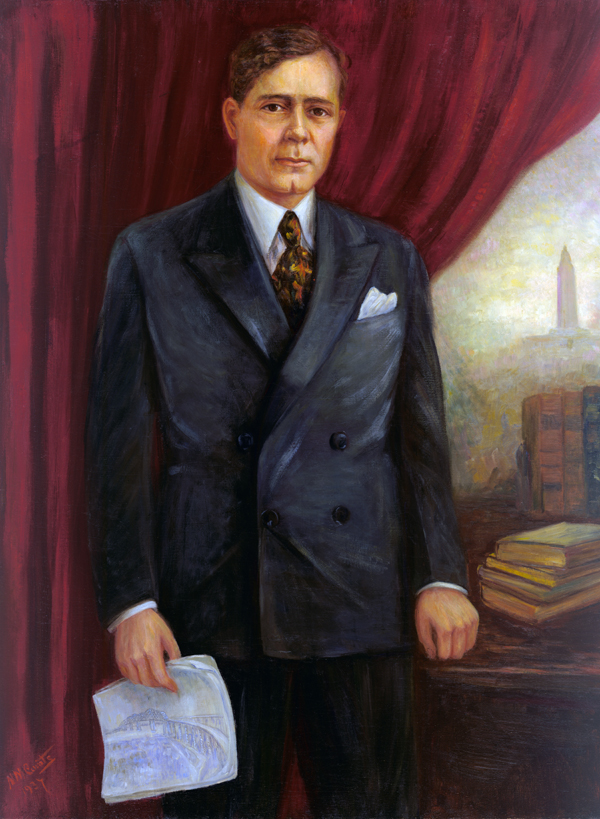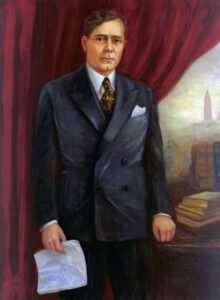Anti-Longism
Huey P. Long was one of the most colorful and controversial politicians in Louisiana history. Admiration of his leadership was strong, but so was contempt; the contempt ultimately resulted in his death at the hand of a disgruntled citizen.

Courtesy of Louisiana State Museum
Governor Huey P. Long. Comte, Natale M. (Aritist)
On the eve of the Great Depression, Louisiana politics increasingly came to be dominated by the powerful persona of Governor-turned-Senator Huey Long and his minions. As Long recast the political dynamic of Louisiana, he attracted legions of supporters—mostly poor, rural, and perpetually excluded from the halls of power—with his populist rants against big business and proclamations to “Share Our Wealth.” As with any emerging politician or political machine, each success brought Long increasing numbers of opponents. Many were conservative members of the Louisiana legislature; some were businessmen opposed to increased state spending. Still others were personally offended by Long’s iron-fisted methods. Though they represented diverse interests and ambitions, opponents of the Long machine shared one controlling certainty—determined hostility toward Huey Long. They rarely coalesced as an organized political entity, but because of this omnipresent shared goal, they were often referred to as anti-Longs or anti-Longites.
The Rise of Huey Long
Raised in Winn Parish amid the political and economic despondency that characterized much of north-central Louisiana in the early twentieth century, Long at an early age revealed exceptional intelligence and political acumen. The Louisiana of his youth was characterized by poverty and despair—implications of defeat in the Civil War, exploitation by distant market forces, and neglect from insensitive local politicians. As he advanced politically from railroad commissioner to governor, and finally to US senator, Long offered the common folk relief through improved roads, free school textbooks, and tax reductions. In order to pay for his programs Long purged state offices of those who opposed his policies and packed them with his own loyalists, while shifting the tax burden to timber interests and his favorite target, Standard Oil, which had long exploited Louisiana’s resources but offered little in return to the state. To thousands of Louisianans, Long personified social justice and opportunity for the oppressed.
While Long offered relief to the poor that correspondingly annoyed those who were expected to pay for his social programs, the Long machine also included other qualities that ensured determined opposition would develop. Long’s personal character was a major part of the problem. Though energetic and hard working, Long was crass and profane. Not content to whip them at the polls, Long found it necessary to berate and insult his opponents at nearly every opportunity. In a state where many people regarded personal and familial honor as more important than life itself, Long ceaselessly taunted and denigrated those opposed to his policies, often mocking the physical characteristics of his opponents. He referred to veteran US Senator Joseph Ransdell, a former ally and his opponent in the 1930 Senate race, as “Old Feather Duster”; Mayor T. Semmes Walmsley of New Orleans endured the epithet “Turkey Head”; aged former governor J. Y. Sanders was derided as “Buzzard Back” due to his stooped posture; the former governor’s son was regularly marginalized as “Little J. Y.” Few would declare Long a gentleman.
Abuse of Power
Still worse in the eyes of not merely his opponents but of those committed to the democratic process, was Long’s willingness to defy mandated legal procedures to advance his personal political power, even to the point of seeking to gain control of the state courts. As he delivered necessary reforms, Long seemed increasingly to be consumed by a ceaseless desire for more power. He rapidly concentrated virtually all aspects of state authority under his ultimate control in Baton Rouge and ruthlessly marginalized any who opposed him. A series of laws and constitutional amendments were passed by the Long-controlled legislature to expand the governor’s ability to appoint cronies to state offices. Local political entities were rendered almost exclusively dependent on state authority, and electoral districts were gerrymandered specifically to defeat Long opponents. Even when he was elected to the US Senate in 1930, Long continued to exercise gubernatorial power in Louisiana through the office of his puppet successors, Alvin Olin King and Oscar K. Allen. In 1934 Long went so far as to order National Guard troops into New Orleans and declared martial law to wrest control of the city from Mayor Walmsley, who had led an anti-Long rally in Baton Rouge. Such heavy-handed disregard for the democratic process soon made anti-Longs out of powerful figures and corporations ranging from Standard Oil to President Franklin Roosevelt, who allegedly declared Long one of the two most dangerous men in America (the other being anti-Semitic radio evangelist Father Charles Coughlin). A coalition of conservatives in the Louisiana House of Representatives became known as the “Dynamite Squad” due to their willingness to detonate any proposal supported by Long.
Though Long continued to taunt and berate his opponents, he was clearly concerned about the determination of some anti-Longs. He became the first Louisiana governor to hire bodyguards, soon employing enough for a small military company. He found plots against him nearly everywhere, especially after anti-Longs coalesced into loose organizations such as the Square Deal Association. Formed originally by disgruntled Standard Oil employees, the Square Dealers eventually included diverse groups and individuals committed to one purpose—getting rid of Long by any means necessary. Long disrupted the ill-defined plans of the Square Dealers by sending the state National Guard against them during a gathering of anti-Longs at the East Baton Rouge Parish Courthouse. The Square Dealers left the courthouse but engaged in a brief armed skirmish at the Baton Rouge airport. Tear gas and bullets were fired; there was one injury but no fatalities.
A Legacy after Assassination
Contempt for Long continually increased. On the evening of September 8, 1935, Long was monitoring a session of the Louisiana legislature when an armed young physician approached him in a capitol corridor and initiated a confrontation that resulted in the deaths of both Long and his assailant. In the aftermath of the shootings it was revealed that the alleged assassin, Dr. Carl A. Weiss, was the son-in-law of anti-Long judge Benjamin Pavy, whose judicial district was being gerrymandered by Long’s supporters in the legislature that very night.
Despite Long’s death the Long machine continued as a potent force in Louisiana politics under the successive leadership of Governor Richard Leche and Long’s colorful brother Earl Long, who ascended to the governor’s office after Leche’s scandal-ridden resignation in 1939. As corrupt practices in the Long camp became increasingly public, so did the appeal of the anti-Longs, who in 1939 successfully elected reform-minded Sam Jones governor of Louisiana. The competition between the Long and anti-Long camps remained a guiding determinant of the Louisiana political scene into the 1970s, and it continues to influence some regions of the state to this day.
